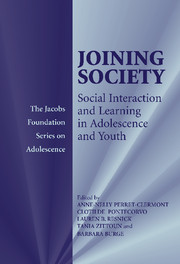Book contents
- Frontmatter
- Contents
- List of Contributors
- Foreword
- Preface
- I Introduction
- II Youth-Constructed Socialization
- III Personal Agency Through Collective Activity
- 8 Learning and Thinking in Adolescence and Youth: How to Inhabit New Provinces of Meaning
- 9 From the Provinces of Meaning to the Capital of a Good Self: Some Reflections on Learning and Thinking in the Process of Growing Adult in Society
- 10 Preapprenticeship: A Transitional Space
- IV Learning in Practice and Discourse
- V Intergenerational Sites for Thinking
- VI Pathways to Adulthood in National Context
- Index
- References
9 - From the Provinces of Meaning to the Capital of a Good Self: Some Reflections on Learning and Thinking in the Process of Growing Adult in Society
Published online by Cambridge University Press: 08 January 2010
- Frontmatter
- Contents
- List of Contributors
- Foreword
- Preface
- I Introduction
- II Youth-Constructed Socialization
- III Personal Agency Through Collective Activity
- 8 Learning and Thinking in Adolescence and Youth: How to Inhabit New Provinces of Meaning
- 9 From the Provinces of Meaning to the Capital of a Good Self: Some Reflections on Learning and Thinking in the Process of Growing Adult in Society
- 10 Preapprenticeship: A Transitional Space
- IV Learning in Practice and Discourse
- V Intergenerational Sites for Thinking
- VI Pathways to Adulthood in National Context
- Index
- References
Summary
We can, crudely speaking, distinguish between two basically different epistemologies in social psychology: one in which the primary source of meaning is the individual subject, and in which intersubjectivity is considered a consequence of that condition; and another one in which intersubjectivity is taken as the primary source of meaning and the individual subject only as a derivative of that condition (e.g., Rijsman, 1990, 1996; Rijsman & Stroebe, 1989). Classic experimental social psychology, which emerged from general experimental psychology early in the 20th century, is clearly an example of the first epistemology, whereas social constructionism (e.g., Gergen, 1985, 1994) and sociogenetic constructivism (e.g., Doise, 1989; Perret-Clermont & Nicolet, 1988) are examples of the second epistemology. In addition, concepts discussed in chapters in the present volume (e.g., Carugati's provinces of meaning and Pontercorvo's thinking with others, as well as papers that triggered several of my comments in this chapter) are examples of the second epistemology. Therefore, I begin this chapter with a short outline of the intersubjective construction of meaning and then use the fruits of this outline to deal with the issue of growing adult in society.
The Social (in the Sense of the Intersubjective) Construction of Meaning
Once we realize that understandable meaning cannot be autistic, but by its very definition must be social, we also realize that meaning has to be a product of the coordinated interaction between subjects and that the apparently individual discovery of meaning must be a quasi-individual reproduction of that coordinated interaction.
- Type
- Chapter
- Information
- Joining SocietySocial Interaction and Learning in Adolescence and Youth, pp. 141 - 152Publisher: Cambridge University PressPrint publication year: 2003

